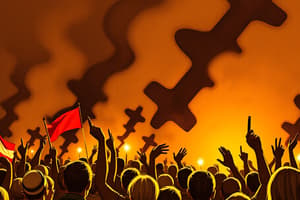Podcast
Questions and Answers
What primarily distinguishes culture from society?
What primarily distinguishes culture from society?
- Culture is static, while society is dynamic.
- Culture is shared beliefs, while society includes tangible structures. (correct)
- Culture can be seen with the senses, while society cannot.
- Culture is material, while society is immaterial.
Which of the following best represents a component of society?
Which of the following best represents a component of society?
- Cultural norms
- Schools (correct)
- Filipino humor
- Belief in God
How do culture and society interact according to the provided content?
How do culture and society interact according to the provided content?
- Society exists independently of culture.
- Society defines culture entirely.
- Culture is more important than society.
- Culture creates society and society influences culture. (correct)
What is meant by 'intersubjectivity' in the context of culture?
What is meant by 'intersubjectivity' in the context of culture?
Which of the following is NOT a characteristic of society as described?
Which of the following is NOT a characteristic of society as described?
Which of these elements is considered part of the population in a society?
Which of these elements is considered part of the population in a society?
What term refers to enduring organizations that significantly influence behavior within a society?
What term refers to enduring organizations that significantly influence behavior within a society?
Which statement reflects a misunderstanding of the relationship between culture and society?
Which statement reflects a misunderstanding of the relationship between culture and society?
Which component of culture includes knowledge, beliefs, art, law, morals, customs, and habits acquired as a member of a society?
Which component of culture includes knowledge, beliefs, art, law, morals, customs, and habits acquired as a member of a society?
What term describes the social rules of human interaction that dictate acceptable versus unacceptable behavior within a community?
What term describes the social rules of human interaction that dictate acceptable versus unacceptable behavior within a community?
Which of the following represents the interconnected systems involving family, school, church, government, and corporations?
Which of the following represents the interconnected systems involving family, school, church, government, and corporations?
Which elements are included in the definition of 'values' within a culture?
Which elements are included in the definition of 'values' within a culture?
What does the knowledge base of a society refer to?
What does the knowledge base of a society refer to?
How is culture characterized according to the content?
How is culture characterized according to the content?
What historical belief is contrasted with the establishment of modern science?
What historical belief is contrasted with the establishment of modern science?
What process is referred to when discussing the transformation of raw materials into cultural matter across different societies?
What process is referred to when discussing the transformation of raw materials into cultural matter across different societies?
Flashcards are hidden until you start studying
Study Notes
Defining Culture and Society
- Society and culture are components of a single social reality, akin to two sides of the same coin.
Culture
- Defined as shared understanding and interpretations of life.
- Consists of language, belief systems, norms, collective practices, and knowledge.
- Involves "intersubjectivity," where interpretations are shaped by interactions among individuals.
Society
- Described through "interobjective" nature, comprising tangible elements identifiable by the senses.
- Includes physical manifestations such as buildings, populations, social groups, and various organizations.
- Culture is internalized and interpreted mentally, while society is directly observed.
Dynamic Relationship
- Culture creates society, while society also influences culture, highlighting their interwoven nature.
- Culture reflects a collective worldview, while society represents the material aspects of that worldview.
Components of Society
- Population consists of individuals grouped by various characteristics: demographics, marital status, religion, ethnicity, and geographic location.
- Social groups and organizations facilitate interactions among people who share a culture, forming norms and collective goals.
- Social institutions (e.g., family, school, church) exert influence on individual behavior and societal norms.
- Social systems encompass a vast array of social group networks and institutions, categorized into economic, political, and cultural systems.
- Natural and technological environments provide resources vital for sustaining life and achieving societal goals.
Components of Culture
- Culture is a complex amalgamation of knowledge, beliefs, arts, laws, customs, and acquired habits.
- Symbols and language serve as essential elements of reality, facilitating communication and knowledge preservation over generations.
- Values and beliefs act as guiding principles for behavior and social interpretation, underpinning actions and motivations.
- Norms establish social rules defining acceptable behavior, varying across different communities.
- Historical context shapes knowledge: from myth-based understanding in the Dark Ages to scientific enlightenment in modern times.
Cultural Change and Contestation
- Culture can be contested, leading to change and the emergence of countercultures, which may eventually reshape societal structure.
- Cultural dynamics are characterized by negotiation, contestation, and transformation.
- The process of "cooking" symbolizes cultural creation through transformation of raw materials, illustrating the inventive aspect of cultures.
Relationship of Man, Culture, and Society
- Social evolution is ongoing, involving adaptation, modification, and discovery, reflecting the continual interplay between culture and society.
Studying That Suits You
Use AI to generate personalized quizzes and flashcards to suit your learning preferences.




